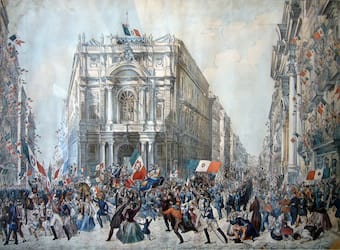595
As William Lecky watched the rapid spread of socialism across the European Continent, he was struck by a powerful sense of déjà vu.
For William Lecky, a contemporary of Karl Marx, ‘Socialism’ meant a politics in which the things that were properly the responsibility of individuals and families were snatched away and dictated by the supposedly wiser Government. Such a politics, he said, was no different to the tyrannies of the past; it merely replaced the arrogance of king or sultan with the arrogance of the politburo.
Picture: By Robert Nanteuil (1623–1678), from the Bibliothèque Nationale de France, Gallica Digital Library and Wikimedia Commons. Licence: Public domain.. Source.
Posted July 31 2020
596
Events in Italy and Austria seemed to be bringing the day ever closer when a European democracy would vote herself into oblivion.
The United Kingdom is not a simple democracy; she is a democratic and parliamentary constitutional monarchy. Just as well, thought Irish historian and Unionist MP William Lecky. The kind of democracy they had on the Continent pandered to grievance groups, extremists and slick campaign strategists, and he feared it would soon become a screen for dictatorship.
Picture: By Franz Wenzel Schwarz (1842–1919), from the Civic Museum of Castel Nuovo, Naples, via Wikimedia Commons. Licence: CC BY-SA 3.0.. Source.
Posted July 31 2020
597
At the height of the Inquisition, King Philip II of Spain sent a glorious fleet against England to bring the nation back to his Church.
When Mary I of England died in 1558, her devoutly Catholic widower Philip II of Spain felt he should have inherited her crown. Instead it went to Mary’s Protestant half-sister Elizabeth, who gave asylum to Dutch Protestants suffering under Philip’s Spanish Inquisition, harassed his Atlantic trade, and in 1587 executed her most plausible Catholic rival, Mary Queen of Scots. A year later, Philip took drastic action.
Picture: From Wikimedia Commons.. Source.
Posted July 29 2020
598
John Balliol had to decide whether his first loyalty was to the throne of Scotland or to the man who put him there.
In 1292, John Balliol became King of Scots thanks to the baffling decision of the Scottish noblemen to let King Edward I of England decide between John and his rival for the crown, Robert de Brus, Lord of Annandale. Edward immediately let it be known that he regarded John as his vassal, and Scotland as an English fiefdom; but John Barbour felt that no Scottish King should serve two masters.
Picture: By PaulT (GuntherTschuch), Wikimedia Commons. Licence: CC BY-SA 4.0.. Source.
Posted July 25 2020
599
When Horatio Nelson stepped aboard HMS Victory in September 1805, the great Admiral knew he had every reason to stay on dry land.
At dawn on Sunday 15th September, 1805, Admiral Horatio Lord Nelson gave the order for his flagship HMS Victory to weigh anchor. Never had Nelson’s duty to go to sea been greater; never had his reasons to stay ashore been stronger. His diary recorded his feelings on the previous Friday night, as his chaise rattled towards towards Portsmouth, and again in the moments before the Battle of Trafalgar.
Picture: By George Romney (1734-1802), via Wikimedia Commons. Licence: Public domain.. Source.
Posted July 25 2020
600
What were the Scots thinking back in 1290, when they asked King Edward I of England, of all people, to choose them a king?
In 1286, Alexander III, King of Scots, was killed in a riding accident; four years later his heiress and granddaughter Margaret died in Orkney aged just seven, leaving Scotland without a clear successor. Thirteen ‘Competitors’ staked a claim. They were whittled down to two, John Balliol and Robert de Brus, and to John Barbour’s disbelief the squabbling Scots asked Edward I of England to choose the winner.
Picture: Via Wikimedia Commons. Licence: Public domain.. Source.
Posted July 25 2020





